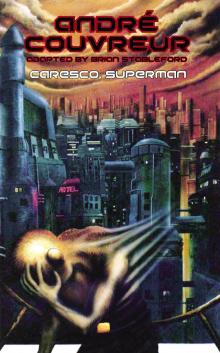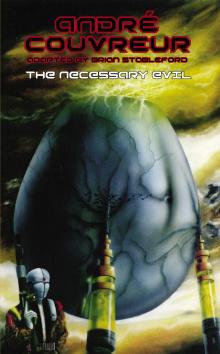- Home
- André Couvreur
The Exploits of Professor Tornada (Vol. 3) Page 3
The Exploits of Professor Tornada (Vol. 3) Read online
Page 3
Having kings and financiers at her feet, a suicide for her sake, and ruination sown around her, however, had not been able to lead her to her unique ambition—which was, deep down, to recreate herself in a domestic hearth and thus win the esteem of society. After several dashed hopes of marriage, she had been about to renounce it, when the Great War broke out. Like so many sinners, her peers, she had run to the bedsides of the wounded—although for some of them, devotion had only been a field of seduction. It was then that she had met the army chief physician Marcel Granive, who had married her three months after she had entered into service by his side.
He was, in any case, an adventurer of sorts himself, that Dr. Marcel Granive, and their souls had been well-matched. He was one of those profiteers of the laboratory, who exploit suffering with coups of frantic publicity and assure themselves of shady political protection in order to help their specialty prosper and obtain honors.
If one takes account of the fact that guilty considerations of society are measured in titles, and that Marcel Granive possessed several of them; that faith in panaceas attract propagandists no less fervent than those of other superstitions; that a sumptuous town house, hung with Gobelins tapestries, served by liveried valets, to which one invites rare diners, and where three autos wait in the garage, is the reliable frame of confidence, and that one only has confidence in esteem; then one will understand that Dr. Marcel Granive had rapidly imported his wife to official milieux, and that they were even more welcome there than the more respectable marriages of real scientists.
That was, for the ex-Carmen Solario, a radiant epoch, all the more so because her arid heart had opened for the first time to a sincere tenderness for the man who had raised her on to the social pedestal. Two children born of their union cemented it further.
So, in that late afternoon, she rejoiced in having renounced tea at the embassy, to have stolen an hour of intimacy from the representative demands made of her companion. They would be able to chat in that warm boudoir, and talk about another adventure: their luminous adventure, the inheritance. Her husband, having left early that morning and not reappeared at lunch, was finally about to give her the last word in that regard.
Her face relaxed when the bell at the coaching entrance rang, followed by the roar of an auto, announcing the master’s return. Still slender at forty, elegantly dressed, his face fashionably clean-shaven, Marcel Granive seen moved aside the Chinese curtain that masked the door.
Carmen immediately flung her arms around his neck. “Ah, there you are! I was getting impatient. Come on, sit here beside me…closer...”
He obeyed. She was his happiness. No shadow of the past afflicted him. He wanted to ignore it.
“Tell me, Marcel. Tell me. I don’t know anything!”
“I was very careful not to wake you this morning, my Carmen. When I went past your room, your eyes were so adorably closed.”
“Tell me. You can be tender afterwards.”
“Well, this is how it is. It’s just as I thought. I found a worn-out man, at the end of his tether, whom no human power could retain on earth.”
“Not even your serum?”
Marcel Granive suppressed a smile. He was pleased that his wife believed in the virtues of his revitalizing serum. He had maintained in her, by the display of his success, as in others by means of publicity, the sentiment that his preparation was the discovery of the centuries. It magnified him further in Carmen’s eyes.
“Not even my serum,” he affirmed. “I arrived too late. I have the pretention of prolonging life, but not rendering it to a dying man.”
“He was in is death-throes, then?”
“More than his death-throes: at the end. The end, I can assure you, in the following hour.”
“Did you wait for it, that hour?”
“What was the point? I wasn’t mistaken. And I was very tired.”
“You work too hard, my Marcel. And it’s for me!” She raised her head proudly. “But we’re going to be immensely rich!”
“At an age, Carmen, at which wealth can no longer be any but a paltry support to happiness.”
“But our children!”
“Obviously, our children…admit, however, that if that idiotic Uncle Louis hadn’t specified that delay, what a strong and beautiful couple we’d make! Gold, eternal power, hands full of gold!”
They fell silent, but without ceasing to exchange their regret. With a simple gaze, a pressure of their hands, which they had entwined, they told one another how they would have utilized the fantastic treasure sooner possessed: she, on her passion for domination, no longer having to measure herself against her rivals by the sumptuousness of dresses, jewels and châteaux; he, on his inveterate need for success and glory, once he no longer had any need to desire money. He did not know exactly what kind of glory—that of politics or that of science; he might have displaced kingdoms, like Napoléon, or created laboratories, like Pasteur, but, one way or another, he would have imposed himself on the world.
Sweet intoxication! In the increasing penumbra of the boudoir, they would have extended it for a long time if the chambermaid had not knocked on the door. She was bringing her mistress the mail. Among the perfumed and blazoned letters, invitations and acceptances, there was an evening newspaper. The doctor picked it up. He augmented the already-considerable profits of his pharmaceutical specialty by gambles on the Bourse, which were generally fortunate. The prices that he scanned were uninteresting; they remained at the same levels as the day before.
On returning to the first page, however, he exclaimed: “Oh! What the…?”
“What is it, my Marcel?”
He passed the paper to his wife. In large letters, a sensational headline stood out:
MYSTERIOUS DISAPPEARANCE OF A DYING MAN
PAINTER THÉOPHRASTE LAPASTILLE SNATCHED
FROM HIS BED BY MASKED MEN
And details followed, which Carmen read aloud in a voice troubled by surprise. The article related that, just as Théophraste Lapastille was rendering his soul, three hooded men had irrupted into the painter’s apartment and, after having reduced his maidservant Mélanie Verdier to impotence, had taken possession of the dying man and carried him away, under cover of darkness, no one knew where. The moans of the maidservant, bound and gagged, had only permitted the crime to be discovered at daybreak. The motive for the theft remained a matter for conjecture, the information provided by the only witness to the incomprehensible removal, the unfortunate maltreated and half-crazed woman, providing no clue.
“That’s amazing,” said Carmen, dropping the newspaper. “Do you understand it, Marcel? Who could have done it? For what reason?”
“I’m as bewildered as you are, my dear.”
“Do you think…that this could be directed against us?”
“No! For one thing, nobody knows about the story of the inheritance. And then, even supposing that someone did know—if the notary had violated the secret we asked him to keep, for instance—how could this hurt us? What does it change? They’ve only carried away a cadaver! A cadaver, I tell you. I’m willing to die myself, at your feet, if Théophraste Lapastille didn’t die within an hour of my visit, at the most.”
“If you’d stayed until the end, this wouldn’t have happened,” she said, critically.
“Yes it would—and in addition, the strange bandits might have done me a bad turn. There might have been two dead men instead of one.”
She paled at that suggestion. To obtain pardon for her reproach she kissed her husband passionately.
“It’s quarter past six,” he said, moving her aside in order to look at his watch. The public prosecutor might still be at the Palais. It’s Villand-Dupuis, you know—we’ve met him. I’ll telephone him.”
He went out in order to go to the apparatus, and came back almost immediately. The prosecutor was waiting for him.
“I’ll go with you, Marcel.”
“Excellent idea.”
They were tacitly counting on
the services that Carmen’s charm and prestige could obtain for them from powerful individuals. Within five minutes she had changed her indoor dress for a ravishing visiting costume. Discreet make-up animated her cheeks and her eyes were shining; she was armed for seduction.
The large limousine rapidly took them to the huge façade of the Palais de Justice in the Rue Pierre-Charron. They went in through the door fitted into the beautiful wrought iron gate, the nearest one to the prosecutor’s office. The stairways and corridors were deserted at that hour. Marcel handed his card to the usher, who introduced them immediately.
Monsieur Villand-Dupuis, commonly known as “the handsome prosecutor,” was a man of about fifty, very impressive in his robes and quite acceptable in a jacket. Particularly sensitive to feminine attractions, he did not hide his pleasure on seeing Carmen come in with her husband. That guaranteed the latter an even warmer welcome.
“Madame Granive’s presence assures me in advance of the reason for your visit, my dear Doctor,” he joked, once the salutations were out of the way.
“I must admit, Monsieur, that I would not have permitted myself to bring my wife if she had not insisted on coming.”
“All the more reason for me to listen to you attentively. What is it about?”
After a few words from Marcel, however, he interrupted him. “Ah! It’s to do with that extraordinary story? A fine poison for us, Doctor. I’ve already passed the case on to an examining magistrate, asking him to deal with it swiftly. He ought to be in the process of interrogating the maidservant now—but we can’t make head nor tail of it! None of the hypotheses we’ve been able to form stand up any better than the rest. Poison, I tell you—and so far, the Prefecture hasn’t been able to bring us anything...” He stopped abruptly. “But may I ask how it concerns you, Doctor?”
“I’m Théophraste Lapastille’s cousin.”
“Well, well! Via Madame?”
“No, on my side.”
“Has he any other relatives?”
“Absolutely none. That’s why I wanted to seek information, and permitted myself...”
“You were right,” said the magistrate. “Quite right! Well, the thing is that I don’t know any more than the evening newspapers have already reported. Are we dealing with an act of vengeance? It’s very improbable. One doesn’t take revenge on the dying. Some farce of drunken art-students? Equally inadmissible. They’d have been heard, surprised, caught, while the crime was carried out slyly, with masterly skill. And we’re tearing our hair out with regard to such a very peculiar theft. No one steals a cadaver like this, damn it!”
He was talking for Carmen, while playing with his paper-knife. He set it down in his desk and continued: “Would you like to know what I think, Madame? The sick man will have been gripped by a fit of delirium and fled his home, and will soon turn up somewhere. As for what his domestic says, which can’t be checked as the concierge didn’t wake up, well, that’s probably delirium too, on the part of an old woman suddenly unhinged by the disappearance of a master she was looking after. She was bound and gagged, you say? But nervous pathology reports equally extraordinary feats of simulation...”
“My husband can contradict you, at least with regard to the moribund running away,” Carmen protested, graciously.
“Indeed, Monsieur,” affirmed the doctor. “Know that I was at my cousin’s bedside shortly before midnight, the presumed time of the kidnapping. A pious duty had brought me there, and I was able to establish medically that he was dying, veritably at his last gasp—and, in consequence, that it was absolutely impossible for him to get up and flee. Physiologically, even a momentary a resurrection would have required a miracle. And in our era, miracles...”
The prosecutor acquiesced with a nod of the head. Then, without any other apparent motive than in order not to let the conversation lapse—and, in fact, without experiencing any professional suspicion—he asked: “Did you see your cousin often?”
“Never.”
“No quarrel separated you?”
“None. Indifference.”
There was, therefore, no question of interest between you?”
Marcel Granive hesitated for a fraction of a second, which was merely to glance at his wife. “None,” he affirmed—without lying, since the maturation date of the inheritance would not arrive for twenty-five years.
“In that case, Doctor, let’s await the result of the investigation.”
They parted, the prosecutor having gallantly kissed Carmen’s hand. In the street, the couple decided to send the auto away and walk home via the quays of the Seine. They liked walking in that fashion; it provided a respite in their hectic life. They went arm in arm, like a student and a grisette. On this occasion, a magnificent deployment of the last solar rays rendered the prospect even more attractive. But was that radiation not a kind of death-throes too? Rather than obtaining relief from the splendor of the expiring star, it brought them back to their obsession.
“Why did you hide the inheritance from Villand-Dupuis, Marcel?”
“What can it possibly have to do with the affair?”
“Perhaps…if someone, for a reason I can’t yet see, but which arises from rancor or vengeance…you have no declared enemies, but might there not be someone you’ve injured, who bears a grudge against you? If someone, as I say, had a reason for wanting Théophraste Lapastille’s cadaver to disappear...”
“With what objective? I don’t see...”
“Well, yes. Might it not be to stop us getting hold of the treasure, my dear Marcel? Haven’t you thought that it might be a trap? It prevents the legal declaration of Lapastille’s decease. It might be thought possible that he’s still alive! People do live to be a hundred. And the succession might be kept in suspense for years on end…and who would that deprive, dear Marcel?”
“In fact, I hadn’t thought of that. I admire you, my dear—you think of everything. But I can assure you a priori that I don’t know of any enemy capable of playing such a macabre trick. No matter. If Lapastille isn’t found, I’ll consult my advocate about the particular case of the enjoyment of a succession when the primary heir has disappeared. There must be a legal precedent.”
He suddenly stopped walking and, squeezing his companion’s hand more forcefully, drew her attention to an old woman dressed in black who was waiting for an autobus at the Pont-des-Arts stop.
“Look—that’s Lapastille’s domestic. She’s just come out of the examining magistrate’s office. What might she know about our affair, and be able to tell us? Shall we talk to her?”
“I think it’s wiser to avoid her, Marcel.”
But the physician had been recognized, and they applauded themselves for not having given the impression that they were about to approach. In order to watch them go past Mélanie had set her shopping-basket on the ground and put her hands on her hips. There was something akin to anger and suspicion in that commonplace gesture. It was, therefore, the case that in her narrow mind, she associated them with the night’s drama...
They went home, pursued by that thought.
The next day, the newspapers gave abundant coverage to the mystery of the Rue du Montparnasse. They recounted their investigations, described the apartment, commented on hypotheses and advertised the trails that were being followed by the police. The Lapastille house was besieged by idlers. Opinion was impassioned. Mélanie, snapped by a host of photographers, appeared in the papers. Furious, she refused to talk to the reporters, but the concierge, whose slumber had kept him out of the adventure entirely, gave details in exchange for a few glasses of white wine taken at the counter, on the zinc.
The Granives waited at home, prudently.
On the third day, Marcel was summoned by the examining magistrate; he went there as a respectable citizen, inconvenienced by the summons.
Mélanie, the magistrate told him, had testified that a quarrel had distanced the two cousins. Marcel demonstrated without difficulty that it only existed in the old woman’s fatigued min
d.
“On the other hand,” the magistrate added, “I’ve received information that a certain testament exists, of an uncle, Louis Lapastille.”
“You will grant me, Monsieur le Juge, that if it were to profit from that testament, which falls due in twenty-five years, I would have been able to wait a few more years before running the risk of committing a crime!” Marcel riposted, impatiently.
“That’s plausible,” said the magistrate, smiling. “All the more so as I’ve received the deposition of the physician who visited Lapastille during the day, and found him so poorly that he judged a further visit superfluous.”
“Then I can’t understand why any suspicion should weigh upon me!”
“But no one is weighing any upon you, Doctor. I’ve interrogated you purely for form’s sake, and in order not to have to disturb you again before closing the file, if the mystery subsists.”
Three days later, however, when Paris was already getting tired of a romance devoid of further incident, Marcel received a further summons. This time it was from the Morgue. He was put in the presence of the corpse of an old man that had been fished out of the Seine upriver of Billancourt, whose description tallied with Lapastille’s.
When he arrived at the mortuary edifice, the examining magistrate, policemen, reporters and a medical examiner were already there. The sole woman among those gentlemen, Mélanie was standing to one side, somber and anxious. An usher introduced the party into a refrigerated room where a rigid form covered by a sheet was lying on a slab.
“Messieurs,” the magistrate explained, “this is a man recovered from the Seine, whose death occurred, according to medical expertise, on or about the day of Théophraste Lapastille’s disappearance. It also seems, again on the advice of the medical examiner, that the body was thrown into the river after life was extinct. On the other hand, the scant information provided by the painter’s identity documents encourage the belief that we are in his presence. That is why we have summoned you here to identify him. What might perhaps cause you to hesitate, however, is that the unfortunate man’s head has been crushed by the propeller of a tug, with the result that it is, strictly speaking, unrecognizable. That will give more weight to the information that can only be provided by Théophraste Lapastille’s maidservant, here present...”

 Caresco, Superman
Caresco, Superman The Exploits of Professor Tornada (Vol. 2)
The Exploits of Professor Tornada (Vol. 2) The Necessary Evil
The Necessary Evil The Exploits of Professor Tornada (Vol. 3)
The Exploits of Professor Tornada (Vol. 3)